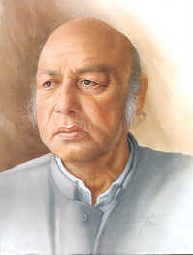- دیپ جس کا محلات ہی میں جلے
- چند لوگوں کی خوشیوں کو لے کر چلے
- وہ جو سائے میں ہر مصلحت کے پلے
- ایسے دستور کو، صبح بے نور کو
- میں نہیں مانتا، میں نہیں مانتا
- میں بھی خائف نہیں تختہ دار سے
- میں بھی منصور ہوں کہہ دو اغیار سے
- کیوں ڈراتے ہو زنداں کی دیوار سے
- ظلم کی بات کو، جہل کی رات کو
- میں نہیں مانتا، میں نہیں مانتا
- پھول شاخوں پہ کھلنے لگے، تم کہو
- جام رندوں کو ملنے لگے، تم کہو
- چاک سینوں کے سلنے لگے، تم کہو
- اس کھلے جھوٹ کو، ذہن کی لوٹ کو
- میں نہیں مانتا، میں نہیں مانتا
- تم نے لوٹا ہے صدیوں ہمارا سکوں
- اب نہ ہم پر چلے گا تمہارا فسوں
- چارہ گر میں تمہیں کس طرح سے کہوں
- تم نہیں چارہ گر، کوئی مانے، مگر
- میں نہیں مانتا، میں نہیں مانتا
|
diip jis kā mahallāt hī meñ jale
chand logoñ kī ḳhushiyoñ ko le kar chale
vo jo saa.e meñ har maslahat ke pale
aise dastūr ko sub.h-e-be-nūr ko
maiñ nahīñ māntā maiñ nahīñ jāntā
maiñ bhī ḳhā.if nahīñ taḳhta-e-dār se
maiñ bhī mansūr huuñ kah do aġhyār se
kyuuñ Darāte ho zindāñ kī dīvār se
zulm kī baat ko jahl kī raat ko
maiñ nahīñ māntā maiñ nahīñ jāntā
phuul shāḳhoñ pe khilne lage tum kaho
jaam rindoñ ko milne lage tum kaho
chaak sīnoñ ke silne lage tum kaho
is khule jhuuT ko zehn kī luuT ko
maiñ nahīñ māntā maiñ nahīñ jāntā
tum ne luuTā hai sadiyoñ hamārā sukūñ
ab na ham par chalegā tumhārā fusūñ
chārāgar dardmandoñ ke bante ho kyuuñ
tum nahīñ chārāgar koī maane magar
maiñ nahīñ māntā maiñ nahīñ jāntā
|
- The light which shines only in palaces
- Burns up the joy of the people in the shadows
- Derives its strength from others' weakness
- That kind of system,
- like dawn without light
- I refuse to acknowledge, I refuse to accept
- I am not afraid of execution,
- Tell the world that I am the martyr
- How can you frighten me with prison walls?
- This overhanging doom,
- this night of ignorance,
- I refuse to acknowledge, I refuse to accept
- "Flowers are budding on branches", that's what you say,
- "Every cup overflows", that's what you say,
- "Wounds are healing themselves", that's what you say,
- These bare-faces lies,
- this insult to the intelligence,
- I refuse to acknowledge, I refuse to accept
- For centuries you have all stolen our peace of mind
- But your power over us is coming to an end
- Why do you pretend you can cure pain?
- Even if some claim that you've healed them,
- I refuse to acknowledge, I refuse to accept.
|
दीप जिस का महल्लात ही में जले
चंद लोगों की ख़ुशियों को ले कर चले
वो जो साए में हर मस्लहत के पले
ऐसे दस्तूर को सुब्ह-ए-बे-नूर को
मैं नहीं मानता मैं नहीं जानता
मैं भी ख़ाइफ़ नहीं तख़्ता-ए-दार से
मैं भी मंसूर हूँ कह दो अग़्यार से
क्यूँ डराते हो ज़िंदाँ की दीवार से
ज़ुल्म की बात को जहल की रात को
मैं नहीं मानता मैं नहीं जानता
फूल शाख़ों पे खिलने लगे तुम कहो
जाम रिंदों को मिलने लगे तुम कहो
चाक सीनों के सिलने लगे तुम कहो
इस खुले झूट को ज़ेहन की लूट को
मैं नहीं मानता मैं नहीं जानता
तुम ने लूटा है सदियों हमारा सुकूँ
अब न हम पर चलेगा तुम्हारा फ़ुसूँ
चारागर दर्दमंदों के बनते हो क्यूँ
तुम नहीं चारागर कोई माने मगर
मैं नहीं मानता मैं नहीं जानता
|
